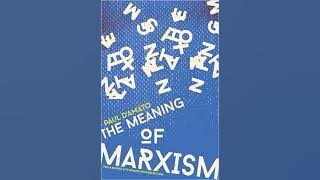Paul D’Amato’s “The Meaning of Marxism” Audiobook offers a clear, comprehensive introduction to Marxist theory and its relevance today. Marxism, a socio-economic theory developed by Karl Marx, seeks to explain class struggles and societal development.
Paul D’Amato’s audiobook serves as an accessible guide to understanding these complex ideas. It dissects the principles of Marxism, making them relatable to contemporary issues. Listeners gain insights into historical materialism, the labor theory of value, and the dynamics of capitalism.
The audiobook’s straightforward approach helps demystify Marxist concepts for newcomers. D’Amato’s work emphasizes the ongoing relevance of Marxism in analyzing modern social and economic inequalities. This makes it a valuable resource for anyone interested in political theory and social justice.

The Roots Of Marxist Philosophy
Marx lived in the 19th century. This was a time of great change. The Industrial Revolution was happening. Factories were popping up everywhere. Workers were treated poorly. They had long hours and low pay. Rich people got richer. Poor people stayed poor. Marx saw this and wanted to help. He thought deeply about these problems. He wanted to make the world better.
Marx read many books. He studied philosophers like Hegel. Hegel talked about ideas and history. Marx also read about economics. He liked the ideas of Adam Smith and David Ricardo. They talked about how money and work should be fair. Marx mixed these ideas together. He created his own way of thinking. This became known as Marxism. His ideas still influence people today.
Key Concepts In ‘the Meaning Of Marxism’
Class struggle is the fight between different social classes. The bourgeoisie owns the means of production. The proletariat works for the bourgeoisie. This creates conflict and tension. Workers want better conditions and pay. The ruling class wants to keep profits high. This struggle shapes society and history. The proletariat has the power to change the system. Workers must unite and fight for their rights. This unity can lead to revolution.
Dialectical materialism is a way of understanding change. It looks at how contradictions drive progress. Everything changes through conflict and resolution. History moves through stages. Each stage has its own conflicts. These conflicts push society forward. Material conditions shape our ideas and beliefs. This means our environment affects how we think. Understanding this helps us see why societies change. Progress is not always smooth but it always moves forward. Dialectical materialism gives us a tool to understand the world.
Impact Of D’amato’s Audiobook On Modern Interpretations
Paul D’Amato’s audiobook has revived interest in Marxist theory. Many people now explore Marxist ideas. The audiobook is easy to understand. It makes complex ideas simple. This helps reach a wider audience. Students and activists find it useful. They can learn Marxism on the go. The audiobook format is convenient. It fits busy lifestyles. D’Amato’s clear narration adds value. This has made Marxism more accessible.
The audiobook shows how Marxism applies today. It connects old theories to modern issues. Economic inequality is a key topic. D’Amato explains it well. He also covers labor exploitation. The audiobook helps people understand social injustices. It encourages critical thinking. Listeners can apply Marxist ideas to current events. This makes Marxism relevant again. D’Amato’s insights are valuable for activists. They use these ideas in their work.


Conclusion
Paul D’Amato’s “The Meaning of Marxism” audiobook offers deep insights into Marxist theory. It’s a must-listen for anyone interested in social justice and economic equality. This audiobook helps simplify complex ideas, making Marxism accessible to everyone. Explore this resource to enhance your understanding of Marxist principles today.



